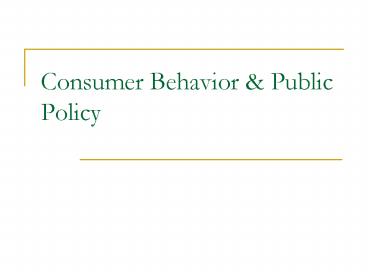Consumer Behavior - PowerPoint PPT Presentation
1 / 13
Title:
Consumer Behavior
Description:
Ads which have the capacity to deceive consumers (i.e., consumers form beliefs ... Ads have the capacity to deceive consumers acting reasonably (consumers are ... – PowerPoint PPT presentation
Number of Views:37
Avg rating:3.0/5.0
Title: Consumer Behavior
1
Consumer Behavior Public Policy
2
Why the Concern?
- Advertising -- communication by an identified
sponsor about its goods or services, meant to
inform or persuade using a mass media vehicle - Inherently one-sided
- Somewhat intrusive
- Advocative
- Should advertising be used only to inform?
- Should advertising be used to persuade?
3
Why the Concern?
- Advertising decisions and executions are often
made by an agency external to the firm (Ad
agency) - Will the ad agency use the same ethical standards
that the firm would use? - FTC has decided that in some cases, the answer
may be NO - Moreover, FTC has decided that in order to
maintain a fair and competitive playing field,
certain ad rules must be followed - So advertising is regulated
- BUT HOW MUCH? HOW SHOULD IT BE DONE?
4
Why the Concern?
- Advertising continuum
- Information Persuasion Embellishment
Deception - Consumer is protected (by law) from deception.
What about embellishment?
5
Regulation of Ads
- Deceptive practices are monitored and laws are
enforced by the Federal Trade Commission (FTC) - Protects consumers from fair and unethical
practices - Protects competition
6
Regulation of Ads
- How does the FTC determine whether ads are
deceptive (CB has helped) - Deceptive Ads have 3 components
- Ads which have the capacity to deceive consumers
(i.e., consumers form beliefs about the
advertised brand which cannot be substantiated by
the advertiser)
7
Regulation of Ads
- Components of deceptive advertising
- Ads have the capacity to deceive in a material
manner (i.e., unsubstantiated beliefs are
important in terms of consumers buying behavior)
8
Regulation of Ads
- Deceptive advertising -- components of law
- Ads have the capacity to deceive consumers acting
reasonably (consumers are acting with care and
credulousness)
9
Regulation of Ads
- Deceptive advertising -- punitive actions
- Cease desist orders
- Corrective ads
- Do they work? -- Listerine case
- Fine retribution
10
Advertising Children
- Issue 1
- Can children distinguish ads from programs?
- Those aged 7 or less can not
- Should advertisers be allowed to target such kids?
11
Advertising Children
- Issue 2
- If children are exposed to ads, do they have the
defenses to deal with them? - Not those less than the age of 8 (although, this
may be changing media education programs exist
in most schools) - Defenses seem to emerge for kids aged 8 - 12
- Should advertisers be allowed to target such
kids? All kids?
12
Advertising Children
- Issue 3
- Do programs which feature toys as characters
negatively affect kids? - Parents think so
- Unfairly influence kids choices
- Kids think products will be like those in the
show - Often lead children to act in an antisocial
manner - Leads kids to play less creatively
13
Advertising Children
- Public Policy Actions
- Stations must provide 3 hours of educational
television per day - Stations must provide commercial identifiers
- Restrictions on certain ads during toy-based
programs - No advertising for toys that are related to the
program































